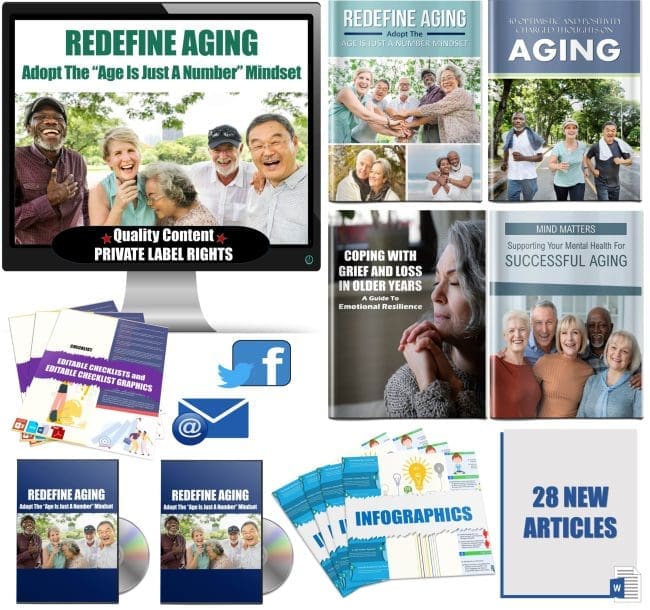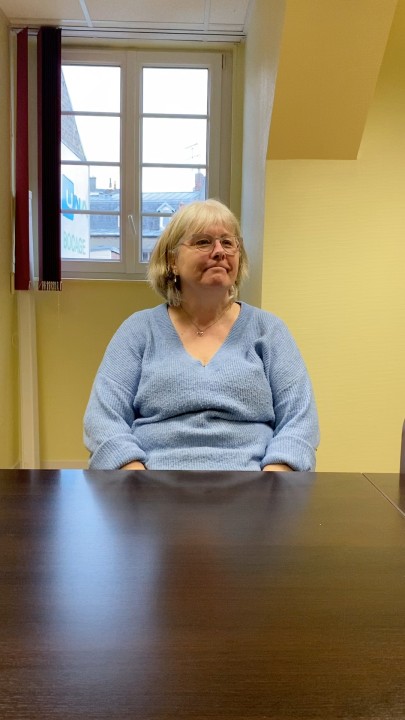Is Age Just A Number? How Mindset And Lifestyle Influence Aging

Table of Contents
The Power of a Positive Mindset
Our mental attitude significantly impacts our physical and emotional well-being, influencing how we age. A positive mindset is more than just "thinking happy thoughts"; it's a proactive approach to life that strengthens resilience and promotes longevity.
Optimism and Longevity
Research consistently shows a strong link between optimism and improved health outcomes. Positive thinking helps reduce stress, a major contributor to many age-related diseases.
- Improved immune function: Optimistic individuals often exhibit a stronger immune response, better equipped to fight off illness.
- Lower risk of chronic disease: Studies link positive attitudes to lower risks of cardiovascular disease, diabetes, and certain cancers.
- Better cardiovascular health: Stress reduction, a byproduct of optimism, positively impacts blood pressure and heart health.
- Increased lifespan: Numerous studies suggest a correlation between optimistic outlook and increased longevity.
Mindfulness techniques, such as meditation and deep breathing exercises, are powerful tools for stress management and cultivating optimism. Positive self-talk and focusing on gratitude are also key elements in building a positive mental landscape.
Growth Mindset vs. Fixed Mindset
A growth mindset – the belief that abilities can be developed through dedication and hard work – is crucial for healthy aging. This contrasts with a fixed mindset, which views abilities as innate and unchangeable. Embracing a growth mindset allows us to adapt and thrive as we age.
- Embracing challenges: A growth mindset views challenges as opportunities for learning and growth, not obstacles to overcome.
- Learning new skills: Continuously learning keeps our minds sharp and engaged, combating cognitive decline.
- Maintaining cognitive function: Engaging in mentally stimulating activities strengthens brain plasticity and cognitive reserves.
- Adapting to physical changes: A growth mindset allows for acceptance and adaptation to age-related physical changes, fostering resilience.
Cultivating a growth mindset involves setting achievable goals, celebrating small victories, and learning from setbacks. Embrace lifelong learning through new hobbies, courses, or simply engaging in stimulating conversations.
Lifestyle Choices: Fueling Healthy Aging
Our daily choices significantly influence the aging process. Adopting a healthy lifestyle is not about strict deprivation but about making conscious choices that nourish our bodies and minds.
The Importance of Diet and Nutrition
A balanced diet rich in nutrients plays a critical role in slowing down the aging process. Prioritize foods that combat inflammation and provide essential vitamins and minerals.
- Anti-inflammatory foods: Focus on fruits, vegetables, and whole grains, rich in antioxidants that combat inflammation.
- Reducing processed foods: Limit sugary drinks, processed meats, and refined carbohydrates, which contribute to inflammation and chronic disease.
- Hydration: Drink plenty of water to maintain optimal bodily functions and support cellular health.
- The Mediterranean diet: Studies show the Mediterranean diet, rich in fruits, vegetables, olive oil, and fish, is linked to longevity and health.
- Intermittent fasting: (Note: Consult your doctor before starting intermittent fasting. While some studies suggest potential benefits, it's not suitable for everyone and may have risks.)
Include foods like blueberries, leafy greens, fatty fish, and nuts in your diet for their anti-aging properties.
Regular Exercise: Maintaining Physical and Cognitive Function
Regular physical activity is not just about staying fit; it's crucial for maintaining muscle mass, bone density, cardiovascular health, and even cognitive sharpness.
- Cardiovascular exercise: Activities like walking, swimming, or cycling improve heart health and blood flow to the brain.
- Strength training: Building muscle mass helps maintain strength, balance, and independence as we age.
- Flexibility exercises: Yoga and tai chi improve flexibility, balance, and reduce the risk of falls.
Find activities you enjoy and make them a regular part of your routine. Aim for at least 150 minutes of moderate-intensity aerobic activity per week, along with strength training exercises twice a week.
Quality Sleep and Rest
Sleep is crucial for cellular repair, hormone regulation, and cognitive function. Sleep deprivation accelerates the aging process and impacts overall health.
- Establishing a regular sleep schedule: Go to bed and wake up around the same time each day, even on weekends, to regulate your body's natural sleep-wake cycle.
- Creating a relaxing bedtime routine: Wind down before bed with a warm bath, reading, or gentle stretches. Avoid screens before sleep.
- Addressing sleep disorders: If you have trouble sleeping, consult a doctor to rule out any underlying sleep disorders.
Aim for 7-9 hours of quality sleep per night.
Social Connection and Engagement
Strong social connections are essential for mental well-being and longevity. Social isolation and loneliness have significant negative impacts on health.
- Staying socially active: Engage in social activities, join clubs, or volunteer in your community.
- Engaging in hobbies: Pursue activities you enjoy to maintain mental stimulation and social interaction.
- Maintaining close relationships: Nurture relationships with family and friends for emotional support and connection.
Prioritize meaningful connections to combat social isolation and its detrimental effects on health.
Seeking Professional Guidance for Healthy Aging
While taking proactive steps is essential, seeking professional guidance is crucial for personalized support and addressing specific age-related concerns.
Consulting Healthcare Professionals
Regular checkups and screenings are vital for early detection and prevention of age-related health issues.
- Regular checkups: Schedule regular visits with your doctor for comprehensive health assessments.
- Screenings: Undergo recommended screenings for age-related diseases like cancer, heart disease, and dementia.
- Personalized health plans: Work with your doctor to develop a personalized plan that addresses your specific needs and goals.
- Addressing specific age-related concerns: Don't hesitate to discuss any concerns you have with your doctor, whether it's about memory loss, joint pain, or other age-related changes.
Exploring Complementary Therapies
Some individuals find complementary therapies beneficial in supporting their overall well-being. However, always consult your healthcare provider before starting any new therapy.
Conclusion
Age is just a number when we actively participate in our well-being. By embracing a positive mindset, making healthy lifestyle choices, and seeking professional guidance, we can significantly impact the quality and length of our lives. The key takeaways are clear: optimism and a growth mindset bolster resilience; a balanced diet, regular exercise, quality sleep, and strong social connections fuel healthy aging; and professional guidance provides personalized support. Make "age is just a number" your reality. Embrace healthy aging, and start your journey to a healthier, happier life today – age is just a number!

Featured Posts
-
 Frances Convincing Six Nations Win Implications For Ireland
May 01, 2025
Frances Convincing Six Nations Win Implications For Ireland
May 01, 2025 -
 Channel 4 And Michael Sheen Face Legal Action Over Documentary
May 01, 2025
Channel 4 And Michael Sheen Face Legal Action Over Documentary
May 01, 2025 -
 Coronation Streets Daisy Midgeley A Racy Tv Role Before The Cobbles
May 01, 2025
Coronation Streets Daisy Midgeley A Racy Tv Role Before The Cobbles
May 01, 2025 -
 Thi Truong Tieu Hom Nay Phan Tich Gia Va Trien Vong Cho Nong Dan
May 01, 2025
Thi Truong Tieu Hom Nay Phan Tich Gia Va Trien Vong Cho Nong Dan
May 01, 2025 -
 Truong Dh Ton Duc Thang Tinh Than The Thao Va Chien Thang Tai Giai Bong Da Sinh Vien Quoc Te 2025
May 01, 2025
Truong Dh Ton Duc Thang Tinh Than The Thao Va Chien Thang Tai Giai Bong Da Sinh Vien Quoc Te 2025
May 01, 2025
Latest Posts
-
 Trois Jeunes Du Bocage Ornais Un Periple Cycliste De 8000 Km
May 02, 2025
Trois Jeunes Du Bocage Ornais Un Periple Cycliste De 8000 Km
May 02, 2025 -
 Trois Jeunes Du Bocage Ornais 8 000 Km Sans Stress
May 02, 2025
Trois Jeunes Du Bocage Ornais 8 000 Km Sans Stress
May 02, 2025 -
 Guide Pratique L Accompagnement Numerique Pour Les Thes Dansants
May 02, 2025
Guide Pratique L Accompagnement Numerique Pour Les Thes Dansants
May 02, 2025 -
 On N Est Pas Stresse Trois Jeunes Du Bocage Ornais Traversent 8 000 Km
May 02, 2025
On N Est Pas Stresse Trois Jeunes Du Bocage Ornais Traversent 8 000 Km
May 02, 2025 -
 Accompagnement Numerique Pour L Organisation De Thes Dansants
May 02, 2025
Accompagnement Numerique Pour L Organisation De Thes Dansants
May 02, 2025
